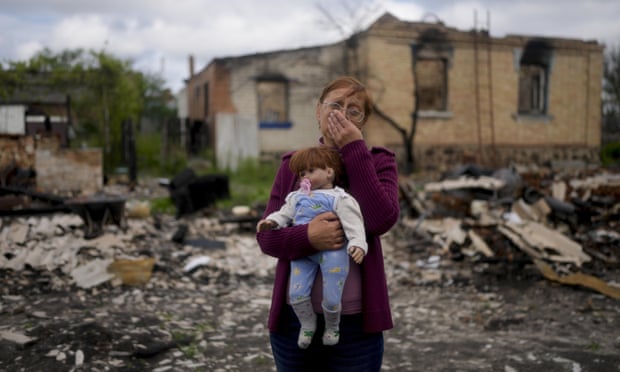1. The war will probably run on for a year at least but is essentially deadlocked and its intensity is lessening
Six months of war may have gone by, but neither Ukraine nor Russia are ready to stop fighting, despite the losses they have sustained. Ukraine wants its occupied territories back, and Russia wants to keep inflicting pain not just on its opponent but, by proxy, the west also. The Kremlin believes winter will play to its advantage.
There have been no negotiations between the two sides since evidence emerged of the massacres at Bucha, Irpin and elsewhere in territories occupied by the Russians north of Kyiv. But movement in the frontlines has been minimal since the fall of Lysychansk at the end of June. Both sides are struggling for momentum and increasingly appear combat-exhausted.
2. Ukraine has no means of effective conventional counterattack, while guerrilla raids are an optimistic way to precipitate a Russian collapse
Ukraine would like to retake Kherson, on the west of the Dnieper river, but a senior administration figure admitted in private that “we do not have enough capacity to push them back”. Kyiv has shifted its strategy to mounting long-range missile attacks and daring special forces raids on Russian bases deep behind the frontlines.
The key presidential adviser Mykhailo Podolyak said the aim was to “create chaos within the Russian forces”, but while this will blunt the invader’s effectiveness, it is not likely it will lead to invaders collapsing in on themselves and voluntarily conceding Kherson, as some Ukrainian officials have hoped.
3. Russia still wants to pound its way forward but its attention is likely to be shifting to holding on its gains and annexing Ukraine territory
Russia has no new offensive plan other than to mass artillery, destroy towns and cities and grind its way forward. It does this in part because it is effective, and in part to minimise casualties, having lost, on some western estimates, 15,000 dead so far. It continues to adopt this strategy around Bakhmut in the Donbas but progress is slow, partly because it has had to redeploy some forces to reinforce Kherson.
The Kremlin may not have achieved what it hoped at the beginning of the war, but Russia now holds large swathes of Ukrainian territory in the east and south, and is actively talking about holding annexation referendums. With cooler weather fast approaching, it is likely to focus on consolidating what it has.
4. Winter will precipitate a fresh refugee crisis and create an opportunity for whoever can best prepare
Winter is uppermost in strategic thinking for both sides. Ukraine is already anxious about humanitarian issues because there is no gas heating available for apartment blocks in Donetsk province and other frontline areas. One humanitarian official predicted there would be a fresh wave of migration in the winter, with perhaps as many as 2 million people crossing the border into Poland.
Russians sees winter as an opportunity. Ukraine fears Russia will target its energy grid, making its heating dilemma more acute, and could simply turn off the vast Zaporizhzhia nuclear power station. Moscow also wants to prolong the west’s pain over energy costs and has every incentive to rack up the pressure.
Spring, though, could be the time for a renewed attack – each side will want to replenish and prepare for what is likely to be another fighting season.

5. The west needs to decide if it wants Ukraine to win or just hold on – and it needs to match humanitarian help to the huge need
Ukraine would have been defeated without western military aid. But at no point so far has the west supplied enough artillery or other weapons, such as fighter jets, that would allow Kyiv to drive the invaders back. Politicians talk about the need to force Russia to the prewar borders but do not provide enough materiel to do it.
At the same time, Ukraine’s humanitarian need is growing. There is, for example, nowhere near enough money for reconstruction – and many homes north-east and north-west of Kyiv remain ruined five months after the Russians left, often with despairing residents living in garages or temporary structures on site.
People who are displaced internally often have to live in schools or kindergartens, temporary accommodation that people struggle to stay in for an extended period of time. Ukraine has a budget gap of $5bn (£4.2bn) a month because of the war; aid and reconstruction will cost many times that.